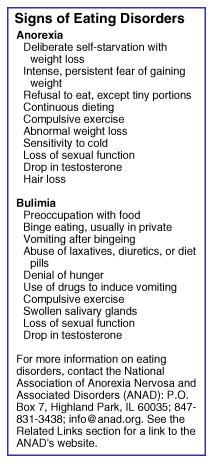Women aren't alone in experiencing eating disorders
By Christine R. McLaughlin
Glance at any magazine, newspaper, or television screen, and you'll probably see very thin, scantily clad, attractive women. It's widely believed that these images are largely responsible for the rash of eating disorders among women.
Yet look at the men in similar advertisements or shows and you'll see equally good-looking, buff guys. But men don't care as much about body image and therefore don't experience eating disorders like anorexia or bulimia, right?
Wrong.
In fact, among the 8 million Americans who suffer from eating disorders, more than 10 percent are male. According to experts, even though more and more teenage boys and men are being diagnosed with anorexia and bulimia, most spend years without a diagnosis from their health care provider because little is known about how to recognize and treat the disorders in male patients.
One man's experience
That was exactly the case for Jim, who had bulimia for about 15 years before finally receiving proper treatment for it. In the meantime, he went through mountains of HMO hassles and several doctors, all the while struggling with alcoholism, self-injury, and two suicide attempts.
"My weight was normal -- pretty typical among people with bulimia," says Jim, who is now 36 and working as a computer programmer in Madison, Wisconsin. "Since I didn't show outward signs, like extreme weight loss, no one ever suspected I had any problems -- not even my family or physicians."
When taking a male patient's medical history, many physicians don't think to ask the same questions they would ask a woman -- the answers to which might alert them to an eating disorder.

Same disorders, only different
The symptoms of eating disorders are almost identical, regardless of gender. "Men get into the same types of obsessive thinking and compulsive ways of trying to change their bodies as women do -- from dieting and working out excessively to using laxatives and purging," says Thomas Holbrook, M.D., psychiatrist and medical director of Rogers Residential Eating Disorder Center in Oconomowoc, Wisconsin, the only residential program in the country geared specifically toward males.
The only real difference between the sexes is the original "goal" that gives rise to the disorder. In women, eating disorders usually start with a desire to be thin, whereas men typically obsess about being muscular.
Also in males, eating disorders often stem from participation in sports like wrestling and football -- both of which often require participants to lose weight -- or from frustration from a sports injury that has taken them to the sidelines.
What causes them?
Most often eating disorders develop in people who have low self-esteem and have unresolved emotional issues, often with family. For these individuals, the disorders are used as a way to control or "level" their emotions, says Vivian Hanson Meehan, R.N., D.S.C., president of the National Association of Anorexia Nervosa and Associated Disorders, an advocacy group based in Highland Park, Illinois.
"They're never satisfied with themselves, so they use all of the eating disorder behaviors to level those bad feelings [to help make them] tolerable," Meehan explains.
In essence, it's almost like they're treating their own self-esteem through an eating disorder. "To feel better about themselves, [men with an eating disorder] are more likely to rely on their appearance or on their ability to change their shape, get stronger, or lose weight," added Dr. Holbrook.
The problem, of course, is that this is a very unhealthy way to feel better about oneself -- both physically and emotionally. While wreaking havoc on the body, an eating disorder tends to perpetuate low self-esteem.
Obstacles to treatment
The fact that eating disorders are still widely considered a women's condition can be a serious impediment for men seeking treatment -- especially with a group therapy program that has mostly female participants.
Simply recognizing the problem is the first step to recovery. The next step, according to experts, is to seek help from a qualified health professional who can refer the individual to the right therapist and eating disorder program.
For Jim, it took his self-will, a good relationship with his psychiatrist, and antidepressant medication to help him through his battle with bulimia. In fact, he has been successfully dealing with it for the past year with no relapses.
"My eating disorder got to the point where I could see very clearly that it could kill me, and that motivated me to change," Johnson says. "Now I'm back on the right track -- living my life instead of dealing with the disorder."
Related links:
Outside link: The National Association of Anorexia Nervosa and Associated Disorders
Outside link: Information on men and eating disorders from Eating Disorders Awareness and Prevention, Inc., a national nonprofit organization

